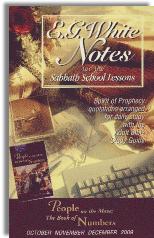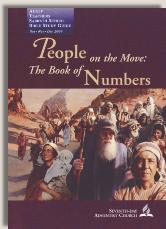|
||||||||||||||
Commentary on "A New Order"
Day 6: Thursday, October 1, 2009
This lesson examines the story of Nadab and Abihu, Aaron’s sons who brought “strange fire” before God in their censers. Instead of using the fire God kindled, they lit their own and took it into the tabernacle. God killed them for this sacrilege.
This lesson also discusses the responsibility of being a priest, of mediating between a Holy God and the sinful people. The thought questions at the end ask how we can distinguish between the holy and the common, the clean and the unclean.
Problems
Again, this lesson misses the distinction between the role of an old covenant priest and that of a born-again believer who is a priest by virtue of the new birth. Moreover, the sin of Nadab and Abihu was not merely mishandling the “sacred”; it was the sin of refusing to acknowledge God’s power and provision and substituting their own provision. They were mishandling their own roles and disrespecting the holiness and forgiveness of God by introducing their own fire. The fire in the tabernacle was a symbol of God, who is a Consuming Fire. They made a mockery of God’s sovereign power and holiness.
Their sin and severe punishment was not primarily about obedience to God’s commandments. It was about disrespecting God’s right to establish His own symbols of His sovereignty and holiness and misrepresenting God’s glory and power to the people.
The Ellen White notes for this day’s lesson recount the story of Nadab and Abihu from the book Temperance. In these passages, Ellen White states that Nadab and Abihu became drunk and, thus dulled intellectually, they sinned by presenting their own fire instead of God’s. She states, “The indulgence of appetite cost those priests their lives. God expressly forbade the use of wine that would have an influence to becloud the intellect” (Temperance, p. 44).
In Leviticus 10:1-11, the story does not say that Nadab and Abihu became drunk, nor does it say God forbade the use of wine. First, the Leviticus passage states that the two men presented their own fire, and God struck them dead because of their disobedience. After the bodies were cleared away, God said to Aaron, “Drink no wine or strong drink, you or your sons with you, when you go into the tent of meeting, lest you die. It shall e a statue forever throughout your generations. You are to distinguish between the holy and the common, and between the unclean and the clean…”(v. 10-11).
There is no indication that God gave this restriction before the two men sinned. Moreover, God did not forbid the use of wine. He only forbade it for the priests before they went into the tent of meeting.
In the new covenant, “things” are no longer sacred or common. When Jesus spoke to the Samaritan woman at the well, she asked Him where the true place of worship was. He said, “The hour is coming, and is now here, when the true worshipers will worship the Father in spirit and truth, for the Father is seeking such people to worship him. God is spirit, and those who worship him must worship in spirit and truth” (John 4:23-24).
In this exchange Jesus clarified that the time for “holy places” and “holy times” and “holy things” was over. From then on, true worship was to be done in the spirit and in truth. It was not regulated by sacred locations or sacred rituals or vessels. Jesus fulfilled all the shadows of the law and the sanctuary services. Sacredness was no longer attached to shadow representations.
Jesus is the Holy One who fulfilled all the shadows represented by holy objects and buildings. True worshipers do not use “holy objects” or places, because in the new covenant, no such thing exists. Only God is holy, and those who are born again are sanctified by the Holy Spirit for His service (Acts 20:32; 26:18; Rom. 15:16; 1 Cor. 1:2; 6:11; Heb. 2:11; 10:10; 10:14; 10:29) and must worship Him in spirit and in truth.
Summary
- The Bible does not say that Nadab and Abihu became drunk and then offered their own fire instead of God’s fire.
- God did not, as Ellen White stated, forbid the use of wine; rather, He forbade the priests to drink it prior to serving in the tabernacle.
- In the new covenant, there are no clean and unclean, sacred and profane things. Jesus fulfilled all the shadows represented by sacred objects and places.
- In the church, it is the individual believers who are born of the Spirit who are sanctified, or made holy and set apart, for God’s service.
- The Spirit of God is what makes believers sanctified. Things and places are not sacred. Only people are indwelt by the Holy God.
Copyright 2009 BibleStudiesForAdventists.com. All rights reserved. Revised September 24, 2009. This website is published by Life Assurance Ministries, Glendale, Arizona, USA, the publisher of Proclamation! Magazine. Contact email: BibleStudiesForAdventists@gmail.com.
The Sabbath School Bible Study Guide and the corresponding E.G. White Notes are published by Pacific Press Publishing Association, which is owned and operated by the Seventh-day Adventist church. The current quarter's editions are pictured above.
Official Adventist Resources
Standard Edition Study Guide Week 1
Teacher's Edition Study Guide Week 1
Easy Reading Edition Study Guide Week 1
Search the Complete Published Ellen G. White Writings


